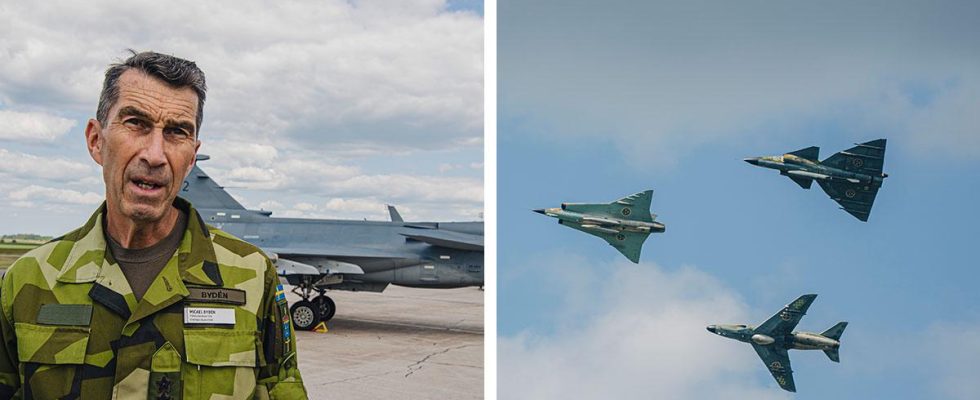UP SALE. Turkey says no – but the work to connect Sweden to NATO continues.
In a secret exercise this week, ÖB has prepared Swedish heads of authorities for the demands of war.
– The focus has been based on the fact that we are part of NATO, says Micael Bydén.
The sun is baking over yellowed grass and black runways on the F 16 air flotilla in Uppsala.
A Jas 39 Gripen plane performs a demonstration for a large number of heads of authorities from the entire total defence. The pilot rolls in the air, loops and rises straight up into the clouds – before letting the plane plummet to the ground.
Commander-in-Chief Micael Bydén squints at the sky.
He is the one who, with some secrecy, invited representatives of government offices, authorities and county administrations to prepare them for Sweden’s NATO accession.
Sweden will become a NATO member, that is ÖB’s starting point. It’s just a matter of when.
If Sweden is then to meet the requirements, the civil authorities are absolutely decisive.
But the uphill climb is significant.
– If the Armed Forces were down to low levels, then civil defense was more or less completely dismantled. We are now proceeding somewhat in parallel, but the conditions are not the same. It is more difficult on the civilian side today, says Micael Bydén.
At the same time, the requirements are higher.
Before the Swedish defense began to be disarmed, the Armed Forces had significantly greater resources to manage transport, set up field hospitals and distribute foodstuffs on their own.
– Now this is available elsewhere. This means that we have to be clear about where the resources are, when we might need them and in what volumes, says Micael Bydén.
full screen
Next
JAS 39 Gripen
1 / 2Photo: Jimmy Wixtröm
Healthcare is a particular dilemma, designed to care for a civil society in peace – not large numbers of wounded in war.
– We are looking at what we can do ourselves, and above all that there is care capacity in areas where there could be major damage outcomes. It should not be taken for granted that battles or military operations will take place where there is capacity. There may be other places as well. Then it is partly necessary to take stock and know what we have, and partly to put perspective on what may be needed, says Micael Bydén.
– Just look in Ukraine. There, healthcare facilities, hospitals and ambulances have been the target of pure terrorist bombings. Rather than them being protected via international law, they have been given up on them. And then it doesn’t matter how big the volumes are, if it’s not protected.
Lotta Medelius-Bredhe, director general at Svenska kraftnät, has participated in ÖB’s exercise. She says that Sweden must be ready to face the kind of attack on the energy infrastructure that Ukraine has been exposed to.
– On the one hand, you can learn lessons from there, but also make sure you have good repairability, good redundancy and robustness, but also cyber protection. There are many lessons to be learned, she says.
ÖB wants to create broad understanding in official Sweden for NATO’s concept of deterrence and defence, and NATO’s internal planning processes.
Most concretely, Sweden’s capacity for host country support must be improved. NATO membership means that Sweden must be ready to quickly receive significantly larger foreign units.
– There, the other authorities are a fundamental prerequisite for us to succeed, says Micael Bydén.
During the giant exercise Aurora 23 last spring, an American Marine Corps battalion entered Sweden from Trondheim and made its way down the country by its own machine.
However, the help the Americans needed was extensive.
In Jämtland alone, the police, rescue services, Region Jämtland Härjedalen, the county administration and not least the Swedish Transport Administration were involved, which helped the US armored vehicles to cross the Ljusnan via pontoon bridges.
– We have done it, but in a smaller context. Now it’s about significantly larger volumes, which should be able to come to support or effect more quickly, says Micael Bydén.
During the exercise, the Swedish Armed Forces have shared details of their sharp war planning.
– In the room where we meet, we speak very clearly. There are scenarios we put into words. We can open up our planning and talk about things that we don’t talk about publicly, says Micael Bydén.
– Meeting is extremely important right now, with the world around us. It is sharp mode. We can’t wait any longer for investigations, there are things we need to do right now, says Micael Bydén.
